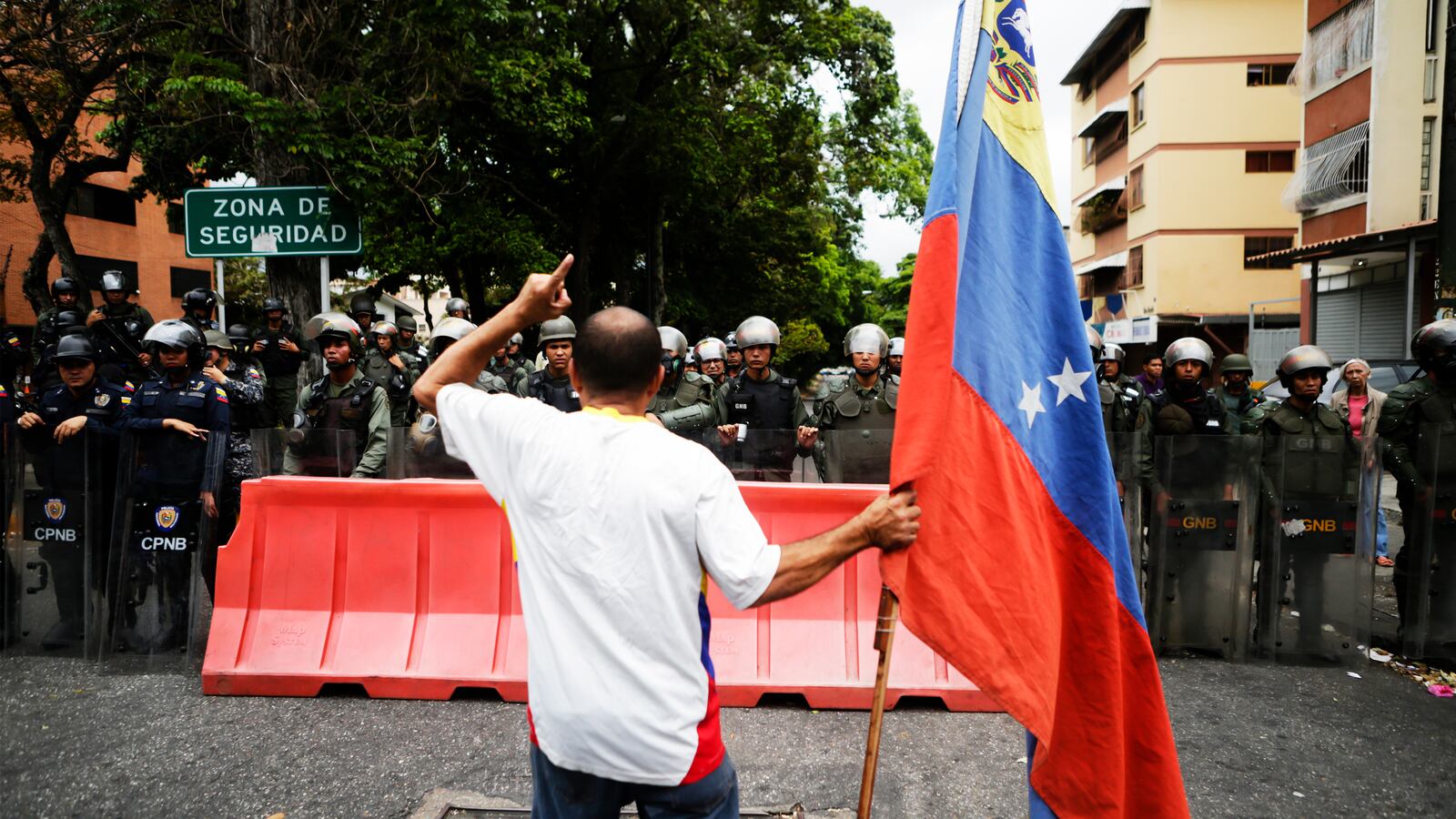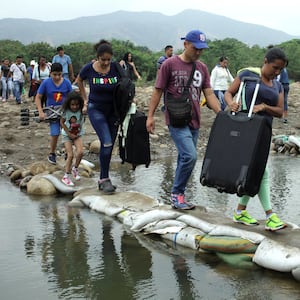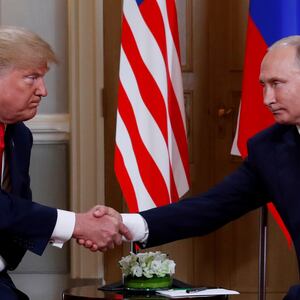CARACAS, Venezuela—“I was there, I saw it with my own eyes. Guaidó was asking the military to let him into La Carlota, and they refused, and then a few minutes afterwards he was making that video claiming he was inside.”
I am interviewing a senior law enforcement officer whom we’ll call Simón. He was at the La Carlota military airbase at 4 a.m. on April 30 in an official capacity. He tells me, in a furious staccato, that the morning everyone is talking about—the coup that dared not speak its name, and failed—was more smoke and mirrors than an image of history in the making.
“When he [self-declared, U.S.-backed President Juan Guaidó] called for the Venezuelan people to come and join him, Guaidó gave the impression that he had the support of the military and that they had turned, but that wasn’t even almost true,” Simón says. “He tried to win time and turn the tide using public opinion—based on a fundamental untruth.”
Simón tells me that the soldiers who were seen behind Guaidó and the SEBIN intelligence service brass, who were said to have turned and joined the opposition, had all been given money and offered an exit from Venezuela in exchange for their participation in the events of April 30. He also confirms what the now exiled Diputado Ismael García had told me two days prior: the big statement outside La Carlota was supposed to take place on May 1, the day of enormous protest that the opposition had called for weeks earlier.
That plan crumbled when, at 2 a.m., the opposition got a tip-off that its most famous leader, Leopoldo López, after years of house arrest, was going to be moved from his home in central Caracas to the SEBIN prison, probably not to be seen again. So the plan was put into action quickly, the first domino was tilted and the result was a makeshift coup that never really was. Without Leopoldo López there wouldn’t be a strong enough statement to rile up the public, but, as we now know, a statement without proper execution can sometimes be even worse.
When I ask Simón what he thinks will happen next, if the moment has truly passed, he tells me that he thinks that the government may fall but that it won’t be because of the opposition.
“This is being decided by other actors, in America and Russia, but of course this process needs a leader of sorts, a figure that serves as inspiration, and that’s what Guaidó is, and his future after all of this is said and done seems highly problematic” he says.
Simón is what some would call a character straight out of central casting, the kind of rugged Clint Eastwood-type that exudes honor and dignity. He carries himself like a military man, and says no more than he absolutely has to, so when he expands on anything, you know it comes straight from the heart.
“Mira, signora, I won’t hide that I want this change, that I need it—not for me, but my children,” Simón says. “That is why I’m so pissed off by all of these fucking tactics, the games from the opposition, lying to people in order to use them to make a push so loud and chaotic that the armed forces won’t have a choice but to turn.”
And it was loud and chaotic. According to my sources, the death toll following April 30 is not five, as widely reported, but 15, and the injured exceed 200. What Simón is saying, be it right or wrong, is that the blood is on everyone’s hands for managing this crisis with such utter disregard for timing and transparency. When I ask him if it would be different if Leopoldo López took Guaidó’s place and stepped up as president, Simón shakes his head and draws a breath that echoes across the courtyard.
“I saw Leopoldo’s eyes on April 30, I saw his demeanor, and he is broken. The torture he was put through, the things he survived, he may as well be dead,” he says. “Or no, I take that back. He is dead. He is not a leader anymore, he is just another dead man standing in the street.”
According to a man we will call Alejandro, an organizing force within the opposition who has chosen not to affiliate with a specific party, the failed coup was actually a success, long term.
The original plan was for Defense Minister Vladimir Padrino López and three other generals to negotiate with the U.S. to hand power over to Guaidó and have Maduro leave for Cuba, but at the last minute that operation went awry.
“Guaidó found out that they were going to arrest him and most of us think that he was simply set up,” Alejandro says. “The generals, with Padrino in charge, were going to double cross him and send Leopoldo López to Ramo Verde [military prison].”
So, Alejandro says, they go with a plan B; Guaidó and Leopoldo López decide to advance quickly, counting on the FANB, the National Bolivarian Armed Forces of Venezuela, to support them even without the treacherous generals.
Russia, seeing that its plan to have Padrino López seize power and ensure stability for their investments is about to go awry, has Padrino stop Maduro from going to Cuba to avoid a power vacuum that could allow the opposition to succeed despite themselves and, with the tiles falling one after one and their supposed protector Guaidó risking imprisonment, the FANB back out of the deal and the coup comes to a halt.
Alejandro and Simón’s information and analysis certainly have overlap, and both men seem to have hope that this story is far from over.
Simón seems resigned to the idea that Venezuelans on their own will not achieve real change and that the cost of liberty is a trade-off with a foreign power. Alejandro, a man who at least on the surface is still invested in the beautiful narrative of a national uprising led by the people and their chosen champion, sees the failed coup as a blessing in disguise.
“The reality is that if Plan A had not been aborted, today we would have a military dictatorship led by Padrino and in the service of Russia. The opposition wasn’t shot down, it dodged a bullet,” he says.
The interim president himself admitted to The Washington Post on Saturday that mistakes were made in the execution of the plan to oust President Maduro and that the opposition had miscalculated the support from the military. Guaidó also said that he would take any offer of help from the U.S. military directly to a vote in the National Assembly, which is more or less what he said two months ago.
So where does this leave everything? What is the next step for a crisis that seems to be taking three steps forward and two steps back?
Between Simón, Alejandro and Guaidó, I am most inclined to go with Alejandro's hopeful cynicism, where you acknowledge that everyone lies and pray that in the end change will come despite the characters who usher it in.









